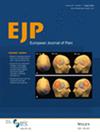HLA-Region Genetic Association Analysis of Breast Cancer Patients With and Without Persistent Postsurgical Neuropathic Pain
Abstract
Background
Surgical nerve injuries lead to persistent neuropathic pain (NP) in up to 30% of patients. Among many other factors, polymorphisms in the human leukocyte antigen (HLA) genes have been suggested to contribute to the development of neuropathic pain.
Methods
We performed a genetic association analysis of HLA class I and class II alleles in women who had been operated on for breast cancer. Patients had a surgeon-confirmed perioperative nerve injury and were examined 4–9 years after their surgery. Patients with painful (cases, n = 27) and painless (controls, n = 30) intercostobrachial nerve resection were studied. Cases included patients with definite NP with worst pain intensity in the past week ≥ 4/10 on a numerical rating scale (NRS) and controls had the same nerve injury with no NP or other pains. Whole-genome single nucleotide polymorphism data were produced, and HLA class I (HLA-A, -B, -C) and class II (HLA-DRB1, -DQA1, -DQB1 and -DPB1) alleles were determined by imputation.
Results
HLA-DRB1*03:01, DQA1*05:01 and DQB1*02:01 alleles appeared to be associated with painful nerve injury after breast cancer surgery (nominal p = 0.007 for all, carriership OR = 12.0, 95% CI 1.38–104; FDR corrected p > 0.07). These alleles comprise the DR3-DQ2 haplotype, which is part of the ancestral haplotype AH8.1.
Conclusions
Our results provide further support for the role of HLA genetic variation in the development of persistent post-surgical neuropathic pain, which indirectly implies a mechanism involving immunological memory in this process.
Significance Statement
We report a novel association between the HLA-DR3-DQ2 haplotype and the development of persistent neuropathic pain after breast cancer surgery. Our results provide further evidence for the role of HLA polymorphism in persistent neuropathic pain.

 求助内容:
求助内容: 应助结果提醒方式:
应助结果提醒方式:


